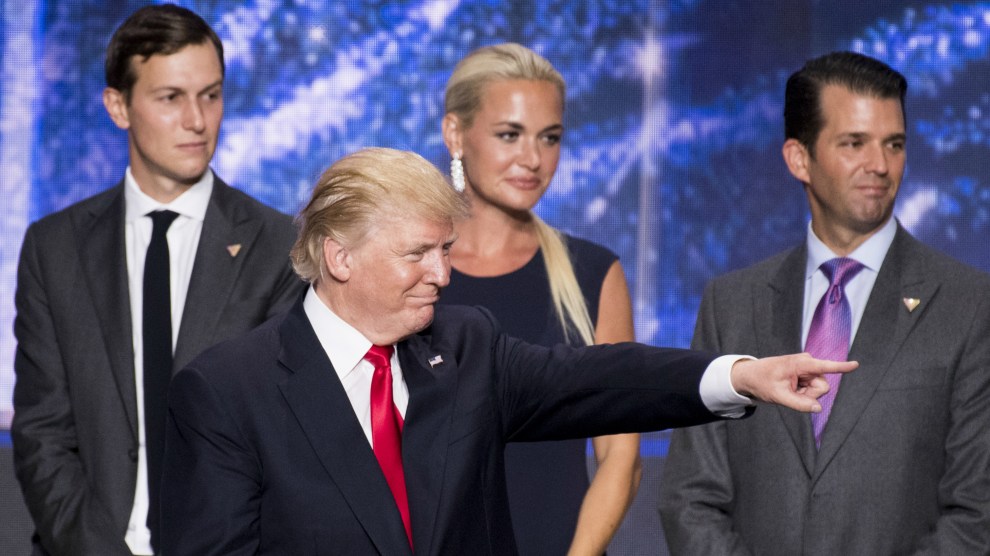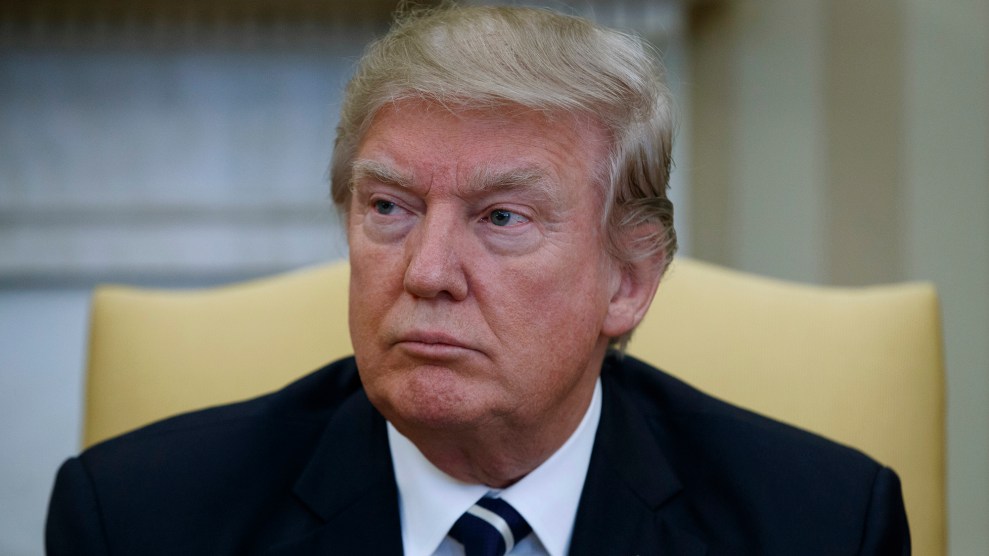
Bill Clark/AP
By now the pattern is clear.
After every major news story regarding the relationship between the Trump administration and Russia comes the official denial. When that denial collapses, then comes a dismissal: Nothing really happened, it didn’t mean anything, it’s all just “a nothing burger,” in the flippant words of Trump chief of staff Reince Priebus.
Then, when additional reporting backs up the story, the Trump administration backpedals, insisting that while some version of the events in question might have in fact occurred, there’s no proof of collusion. In the end comes an attack on the news media or the raising of some other distraction.
We have seen this sequence of events play out again and again—most notably this week with Donald Trump Jr.’s emails revealing how he, along with then-campaign chief Paul Manafort and President Trump’s son-in-law and senior adviser Jared Kushner, met in June 2016 with a Russian-government-connected lawyer offering up dirt on the Clinton campaign. The New York Times broke the story this way:
If the future president’s eldest son was surprised or disturbed by the provenance of the promised material—or the notion that it was part of a continuing effort by the Russian government to aid his father’s campaign—he gave no indication.
He replied within minutes: “If it’s what you say I love it especially later in the summer.”
On July 24, 2016, a little more than a month after his meeting with the Russian lawyer, and two days after WikiLeaks began releasing Clinton campaign emails thought to be hacked by Russian intelligence operatives, Trump Jr. expressed his indignation at the charge from Democrats that Russians were helping his father’s campaign. Trump Jr. told Jake Tapper on CNN that the suggestion of Russian assistance was “disgusting” and “phony.” Trump Jr. went on to say, “I can’t think of bigger lies, but that exactly goes to show you what the DNC and what the Clinton camp will do. They will lie and do anything to win.”
CNN has since compiled a long list of denials from Trump administration officials who have been directly asked if there were any contacts between the Russians and the Trump campaign. For example, also on July 24, 2016, Manafort appeared on ABC’s This Week.
“Are there any ties between Mr. Trump, you or your campaign, and Putin and his regime?” asked George Stephanopoulos.
Manafort responded definitively, “No, there are not. That’s absurd. And, you know, there’s no basis to it.”
But we now have the email chain to prove that Trump Jr., Kushner, and Manafort were talking to the Russians before the release of the stolen emails. Beyond that, we know they were told that the lawyer they met with was a representative of the Russian government and that the information she had “would incriminate Hillary and her dealings with Russia and would be very useful to [Donald Trump]” and that it was “part of Russia and its government’s support for Mr Trump.”
Still, the White House remains adamant that there was no collusion. Deputy press secretary Sarah Huckabee Sanders has said the president’s campaign “did not collude in any way. Don Jr. did not collude with anybody to influence the election. No one within the Trump campaign colluded in order to influence the election.”
Despite what Sanders’ adamant denial suggests, the changing narrative around the meeting with the Russian lawyer, in the words of Washington Post’s Philip Bump, “was not a one-off example of a staffer or ally loyal to President Trump being caught in a factual error or omission related to Russia. Instead, it’s part of a pattern of similar behavior.”
Here are previous examples where Trump officials or family members met with Russians. The responses to the revelations typically follow the same trajectory of denial followed by dismissal:
- Michael Flynn. As Reuters reported in January, Trump’s one-time national security adviser spoke five times in one day in December with then-Russian Ambassador Sergey Kislyak in regards to possibly lifting sanctions against Russia. The Trump administration acknowledged that the calls did happen but said Kislyak and Flynn did not discuss sanctions. The following month, Team Trump decided to fire Flynn for supposedly misleading Vice President Mike Pence about his conversations with the Russians, which did in fact refer to sanctions. Just two days after his dismissal, President Trump blamed Flynn’s demise not on his actions, but on leaks.
- Jeff Sessions. At his early January confirmation hearing, the now-attorney general denied that he had any contacts with Russian officials during the 2016 campaign. “I did not have communications with the Russians” either before or after the election, he told senators. After the Washington Post reported in March that, in fact, Sessions had met twice with the Russian ambassador, a Justice Department spokeswoman admitted the meetings happened but insisted they took place in Sessions’ capacity as a senator on the Armed Services Committee. The disclosure lead to Sessions’ recusal in the FBI investigation into Russian meddling in the election.
- Jared Kushner. The president’s son-in-law and senior adviser failed to disclose several key meetings with Russians, including one with Flynn and Ambassador Kislyak at Trump Tower, as well as another with the head of a Russian bank. (This was all long before the now-infamous meeting with the Russian lawyer, Trump Jr., and Manafort came to light.) Not until March 2, after The New Yorker reported it, did the White House confirm Kushner’s December meeting with Kislyak at Trump Tower. And only later that month, when confronted by the New York Times, did the White House confirm Kushner’s meeting with the Russian banker. As the Times reported on March 27, “A White House spokeswoman, Hope Hicks, confirmed those meetings, saying in an interview that nothing of consequence occurred and portraying them as routine diplomatic encounters that went nowhere.” Hicks hedged further, “[Kushner] isn’t trying to hide anything and wants to be transparent.”
“A lie never lives to be old,” Sophocles once wrote. Today, Special Counsel Robert Mueller’s team of high-powered investigators is cross-referencing the facts with the denials trotted out by the Trump administration. It may feel like it’s taking forever, but the truth will come.







